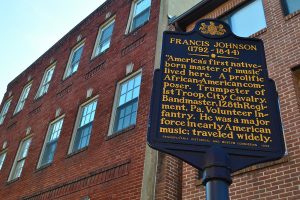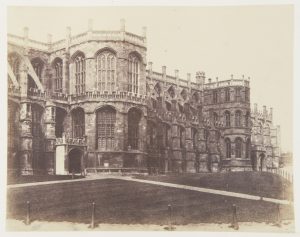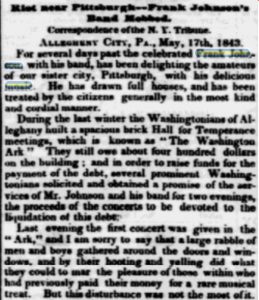Francis (Frank) Johnson (1792–1844)— an “originator of music for the new (American) Republic”—was an African American bandleader, composer, teacher and performer from Philadelphia, Pennsylvania who was central to the cultural and musical life of his locale.[1] Johnson was born within the post-Revolutionary context of a burgeoning community of African Americans in Philadelphia, known as Society Hill.[2] Frank Johnson’s skillset was broad, and besides developing virtuosity on the violin and cornet, he achieved great admiration by Philadelphian elite, whom he composed dances for and performed them with string and brass bands at social events.[3] Johnson lived at 536 Pine Street in Philadelphia for most of his life, a site which today has a commemorative marker honoring the legacy of the trailblazing musician.[4] See below.

Francis Johnson (1792-1844), (Historical Marker at 536 Pine St. Philadelphia PA – Pennsylvania Historical and Museum Commission 1992).
Johnson also composed music for regional militia gatherings, cultivating his capabilities in the wake of a “rush of patriotism” sweeping America after the War of 1812.[5] His brass band played marches and quicksteps (the latter is a type of march)—considered “today as the earliest form of distinctly pure American marches,” Johnson set a standard of influence for American martial music in the early 19th century.[6] He would go on to compose over 200 pieces in a variety of genres.[7] By 1837, Johnson became a pioneering American musical figure in another groundbreaking way—his brass band prepared and embarked on a tour to Europe, performing in London, which was significantly “the first known performance by an American music ensemble in Europe.”[8]
Frank Johnson toured in the United States, which expanded his reputation beyond Philadelphia. Notably, though, such regional tours to the Midwest and other Northeast cities were not always received well. Occupying an era predating blackface minstrelsy, Johnson nevertheless lived at a time when societal racism presented momentous challenges to even free Black communities in the North.[9] After one performance in Allegheny City, Pennsylvania, in 1843 (near Pittsburgh), newspapers reported of a “Riot near Pittsburgh- Frank Johnson’s Band robbed.” [10] Frank Johnson passed away in 1844. Though hindered by racism as an African American and largely overlooked today in American music history, Frank Johnson was an important musical figure of the Antebellum Era who can be understood as an originator of distinct American musical forms and American performance abroad.
[1] Richard Griscom, “Francis Johnson: Philadelphia Bandmaster and Composer.” University of Pennsylvania Almanac, February 14, 2012; Charles Kelley Jones, Francis Johnson (1792-1844): chronicle of a Black musician in early nineteenth-century Philadelphia (United States: Lehigh University Press, 2006), 32.
[2] Jones, Francis Johnson (1792-1844, (United States: Lehigh University Press, 2006), 29.
[3] Griscom, “Francis Johnson,” University of Pennsylvania Almanac, February 14, 2012.
[4] Ibid.
[5] Jones, Francis Johnson, 46.
[6] Ibid.
[7] See quickstep in “Quickstep,” Grove Music Online, 2001, Accessed 29 Nov. 2022. https://www.oxfordmusiconline.com/grovemusic/view/10.1093/gmo/9781561592630.001.0001/omo-9781561592630-e-0000022695; See marches in Earnest Lamb, “The Music of Francis Johnson and His Contemporaries: Early 19th-Century Black Composers. The Chestnut Brass Company and Friends, Tamara Brooks, Conductor. Music Masters 7029-2-C, 1990,” Journal of the Society for American Music 8, no. 2 (2014): 266–67. https://doi.org/10.1017/S1752196314000133.
[8] Griscom, “Francis Johnson,” 2012.
[9] Ibid.
[10] Albany Evening Journal, Albany, New York, May 23, 1843, p. 2.


